
Forks Over Knives: The Plant-Based Way to Health
by Gene Stone,T. Colin Campbell, Caldwell B. Esselstyn Jr.Forks Over Knives analyzes the negative effects of an animal-based foods diet and proposes a more effective, healthier plant-based diet. It is based on research and the groundbreaking documentary "Forks Over Knives," which asserts that by simply rejecting our current diet of animal products and processed foods, we can control and even prevent most degenerative diseases such as heart disease, stroke, cancer, and diabetes.
Moreover, it presents you with two choices – forks (eat the right foods and be healthy) or knives (end up with surgery because of diseases caused by an unhealthy diet). This book is a guide to choosing "forks".
The Benefits Of The "forks over knives" Diet
“A growing number of people are becoming aware that lifestyle choices can have a powerful effect on their health, and paramount among those choices is nutrition.”
The best method for improving health isn't to take massive amounts of medications; instead, eating a whole-foods, plant-based diet might be the answer. Many of us have been addicted to high-fat, high-salt, and high-sugar diets, so eating meals with few plant-based healthy ingredients seems complicated and challenging.
The food industry has convinced us we should eat unhealthy foods. It guides us to eat animal products and foods filled with sugar, salt, and fat that slowly make us ill. Obesity, strokes, heart disease, hypertension, osteoporosis, diabetes, cancer, rheumatoid arthritis, lupus, allergies, and asthma are just some diseases linked to this diet.
A whole-foods, plant-based diet has various advantages, including improved overall health, weight loss, increased energy, reduced degenerative illnesses, and prevention of cardiovascular disease, diabetes, cancer, and various other diseases. If we stick to a healthy diet, we will become more energetic, less worried about our health, and happier.
Actions to take
Create Healthy Eating/Living Habits
“A plant-based diet is a very simple one. It consists of avoiding anything that came from a source that ever had a face or a mother.”
Many diseases may be prevented and, in many cases, stopped or reversed by making better choices at the grocery store and in the kitchen.
When going to the grocery store, we should pay attention to the ingredients list. Manufacturers are always trying to hide how unhealthy the product actually is. Thus, we should be attentive to the actual amount of salt or sugar that can be hidden/replaced with fructose or corn syrup. Similarly, words such as whey, albumen, lactose, caseinate, rennet, casein, etc., can also hide diary.
Diet change is difficult, so we should focus on what we get rather than what we will lose. We only lose unhealthy foods and the risk of being ill while getting a variety of good, whole, plant-based foods that can benefit our health.
When people change their diet, they often worry about all the foods they have to cut out and are concerned about not getting enough vitamins and minerals, which causes them stress. Instead, we can concentrate on all of the foods we can eat and fill our plates with colorful foods that guarantee a lot of vitamins and minerals.
We should also consider vitamin B12 supplementation. Plant-eaters obtain this vitamin from bacteria found in the soil where plants grow. However, since we sterilize our plants so much, we should supplement B12 if blood tests reveal that we are deficient in this essential vitamin.
Actions to take
Your New Healthy Meal Plan
“As Dr. John McDougal says, “There is a right diet for humans,” and it is based on one key principle: Eat plants.”
It's easier to prepare healthy meals daily when we know what to eat and stock our fridge and pantry with healthy ingredients. But it’s best if we can still set some priorities.
Food that is packed with vitamins, minerals, healthy fiber, and antioxidants, such as cruciferous vegetables, leafy greens, sprouts, whole grains, and legumes, can be eaten as much as we want because they are healthy for our bodies and may prevent many diseases. So, we need to make sure we eat various fruits and vegetables each day.
On the other hand, oily foods like nuts, dried fruits, olives, avocado, and so on are the ones we should occasionally eat. Foods like whole-grain pasta, pizzas, waffles and pancakes, plant-milk, oil-free spreads, dressing, and soups are acceptable as long as they are made with integral flour, vegetables, and without oil. While baking and cooking these meals are fine, fresh and raw plants are always a healthier choice.
Actions to take
Don’t just read. Act.

